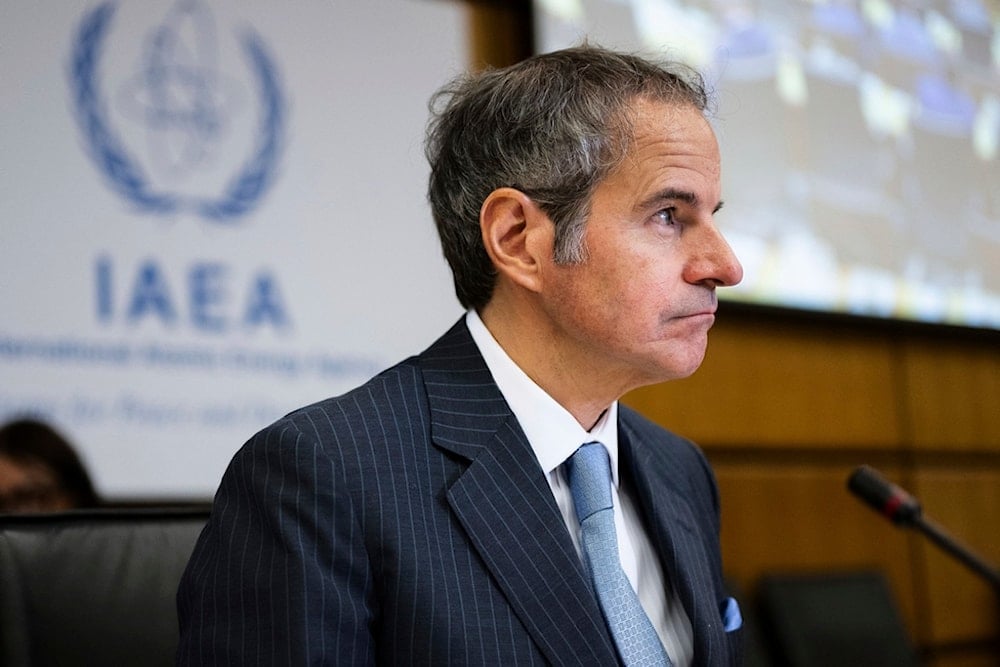IAEA chief urges Iran to disclose uranium transfers after US strike
IAEA Director Rafael Grossi calls on Iran to clarify uranium relocation after US-Israeli attacks, as Iran files a complaint at the United Nations.
-

International Atomic Energy Agency (IAEA) Director General, Rafael Grossi, attends an IAEA Board of Governors meeting in Vienna, Austria, Monday, June 23, 2025 (AP)
Rafael Grossi, Director General of the International Atomic Energy Agency (IAEA), has called on Iran to clarify the whereabouts of enriched uranium allegedly relocated from key nuclear facilities prior to the recent US and Israeli strikes.
Speaking at an emergency session of the IAEA Board of Governors convened to address the attacks on Iran’s nuclear infrastructure, Grossi underscored that Tehran is obligated under its safeguards agreement to inform the agency of any transfer of nuclear material from monitored sites.
“There is a need to notify the Agency of any movement of nuclear materials from safeguarded facilities to other locations in Iran,” Grossi said. “Establishing facts on the ground is essential to any agreement, and that can only be achieved through IAEA inspections.”
He urged Iran to return to the negotiating table and emphasized that IAEA inspectors, described as guardians of the Non-Proliferation Treaty (NPT), must be granted access to the affected nuclear sites. Grossi specifically cited the need to verify the status of Iran’s stockpile of 400 kilograms of uranium enriched to 60%, which he said remains a central concern.
Grossi warns of grave damage
Grossi reported that early assessments show significant structural damage at several Iranian nuclear sites targeted by the US. At the Fordow facility, the site most central to Iran’s 60% uranium enrichment activities, visible craters indicate the use of bunker-busting munitions, aligning with US statements.
“At this time, no one—including the IAEA—can fully assess the underground damage at Fordow,” Grossi said. “Given the explosive payloads used and the sensitivity of the centrifuges to vibrations, extensive damage is highly likely.”
In Isfahan, he confirmed that additional buildings had been damaged, including some associated with uranium conversion operations, and noted that cruise missiles were used. Entry tunnels for enriched uranium storage also appeared to have been hit.
At the Natanz Fuel Enrichment Plant, Grossi stated that the US used bunker-busting bombs in its strike, targeting one of Iran’s most critical enrichment facilities.
US defends attack
The United States defended its actions, claiming the strikes were conducted to protect "Israel". Speaking before the Board, the US representative stated, “Our targeting of Iranian nuclear facilities was aimed at defending Israel.” He further admitted that Washington did not notify the IAEA in advance of the operation, despite the agency’s oversight responsibilities at the affected sites.
Iran’s representative to the IAEA, Reza Najafi, strongly condemned the strikes, emphasizing that the targeted sites were under active IAEA monitoring at the time of the attack.
“Our nuclear facilities were bombed despite the presence of IAEA inspectors and ongoing supervision,” Najafi said.
He reaffirmed Iran’s right to self-defense under international law, warning that “the era of impunity is over” and that Tehran would take appropriate measures to neutralize future threats.
Iran denies radiation leaks
According to Grossi, Iranian authorities informed the IAEA that no radiation leaks had been detected outside the affected sites at Fordow, Isfahan, or Natanz.
Despite the damage, Grossi said Iran could still take protective measures for its nuclear materials and equipment, in line with its obligations under the safeguards agreement. “IAEA inspectors remain in Iran and are ready to resume assessments,” he affirmed.
Grossi concluded by calling for an immediate halt to hostilities to ensure that conditions for safety, security, and verification can be restored. “This is possible, but we need access now,” he said.
Grossi accused of bias
Amir Saeed Iravan, Iran's Permanent Representative to the United Nations, said the public remarks made by Grossi on the eve of the Israeli aggression against the Islamic Republic of Iran constitute a glaring violation of the principle of neutrality required in his position.
Grossi had remarked that “nuclear sites must never be attacked,” yet pointedly refrained from condemning the Israeli aggression on Iran’s nuclear facility, an omission that Tehran views as tacit complicity.
Iravani filed a formal complaint against Grossi, in a letter to the UN Security Council, voicing deep concern over Grossi's grave dereliction of duty, as well as his failure to fulfill his legal responsibilities under the agency's statute.
The Iranian diplomat further noted that Grossi not only failed to condemn the attacks on nuclear facilities under IAEA safeguards but also disregarded the open acknowledgment by "Israel" of its ongoing assaults.

 4 Min Read
4 Min Read










